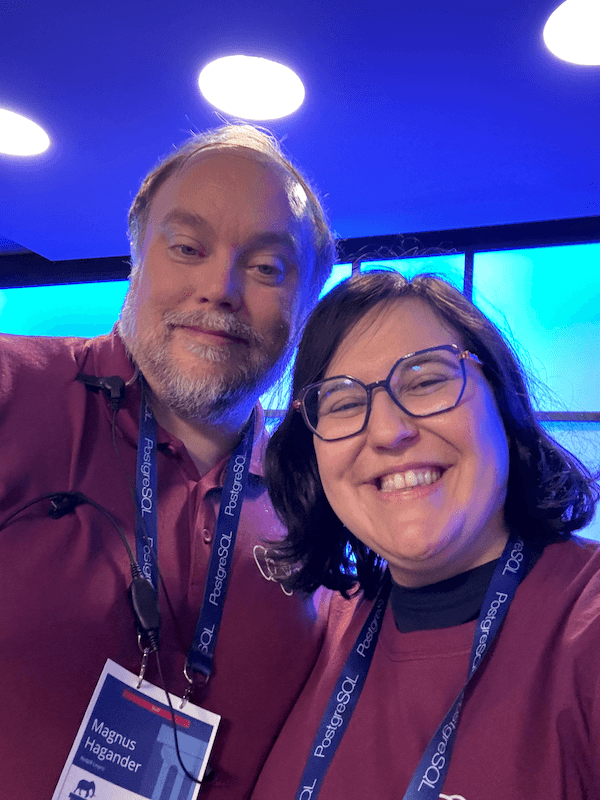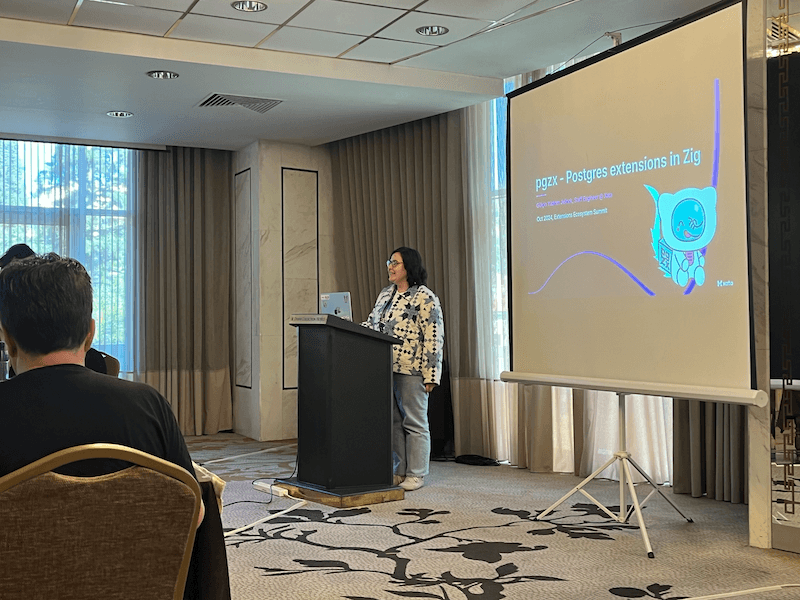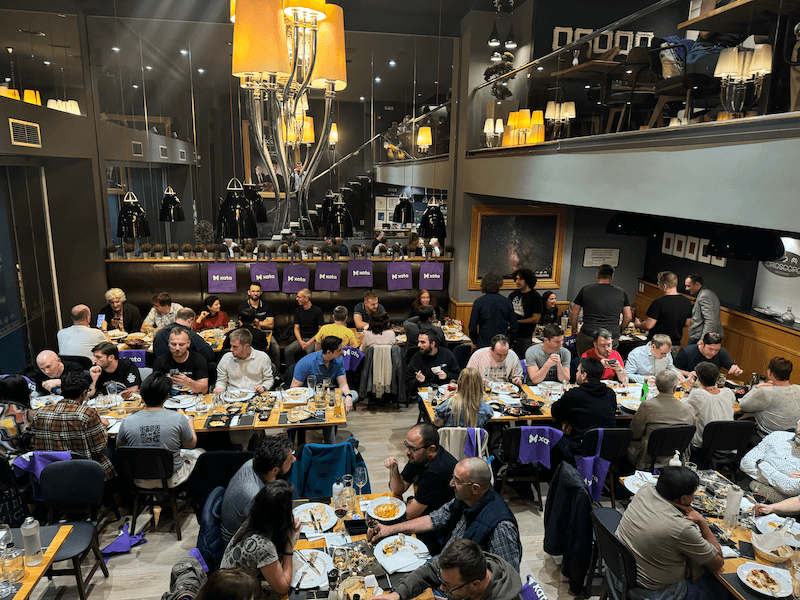Recap of PGConf.EU 2024 in Athens
My notes from PGConf.EU 2024 in Athens, Greece. Talks, extension summit, diversity committee meeting, Xata Postgres dinner, and more!
Author
Gulcin Yildirim JelinekDate published
We finished yet another PGConf.EU in Athens, Greece at the end of October. PGConf.EU is a very special conference for me, and I've written a blog post about it previously here. As usual, it was a great time and I've managed to catch up with dear friends!

Now that the conference is over, I'd like to share some more details about the conference, my experiences, and the talks I attended.
CloudNativePG Training
Day 0 of PGConf.EU is when we do training sessions. My dear friends and former colleagues, Gabriele Bartolini and Leonardo Cecchi, held a CloudNativePG training session. The training was about managing PostgreSQL databases within Kubernetes environments using the CloudNativePG operator.
I've just stopped by to say hi to Gabriele and Leonardo and took a few photos and my colleague Andrew attended the training. We like CloudNativePG a lot at Xata, and if you are interested in learning more about it, I recommend checking out Gabriele's blogs about it. And if you are using CloudNativePG, do not forget to give a star to the CloudNativePG GitHub repository!
PostgreSQL Europe Diversity Committee Meeting
We had the first meeting of the PostgreSQL Europe Diversity Committee. Members of the committee (in alphabetical order) are:
- Flavio Henrique Araque Gurgel
- Floor Drees
- Gülçin Yıldırım Jelínek
- Jimmy Angelakos
- Karen Jex
- Stacey Haysler
- Stefanie Janine Stölting
- Valeria Kaplan
We had a great time discussing the goals and plans for the Diversity Committee.
The goals of the Diversity Committee are:
- Broaden the diversity within the “active core” of the PostgreSQL community.
- Enhance the visibility of underrepresented groups within the PostgreSQL community.
- Raise awareness about the challenges faced by underrepresented groups within the community and highlight the value that diversity brings to it.
- Address the “leaky pipeline” issue by lowering the entry barrier, improving the retention of newcomers, and increasing the engagement of the underrepresented individuals who are already part of the community.

If you are interested in joining the Diversity Task Force, send us an email at .
PostgreSQL Extension Ecosystem Summit & pgzx Talk
After the PostgreSQL Europe Diversity Committee meeting, I've attended PostgreSQL Extension Ecosystem Summit, and gave talk about pgzx.

Zig is a small and simple language that aims to be a "modern C" and make system-level code bases easier to maintain. It provides safe memory management, compilation time code execution (comptime), and a rich standard library. Zig can interact with C code quite naturally: it supports the C ABI, can work with C pointers and types directly, it can import header files and even translate C code to Zig code. Thanks to this interoperability, a Postgres extension written in Zig can, theoretically, accomplish anything that a C extension can. This means you get full power and a modern language and standard library to write your extension.
While in theory you can write any extension in Zig that you could in C, in practice you will need to make sense of a lot of Postgres internals in order to know how to correctly use them from Zig. Also, Postgres makes extensive use of macros, and not all of them can be translated automatically.
This is where pgzx comes in. pgzx is an open-source project that provides a framework for creating PostgreSQL extensions using the Zig programming language. The goal of pgzx is to simplify the process of writing PostgreSQL extensions by leveraging the simplicity and performance benefits of Zig.
What pain points does pgzx address beyond simply enabling Zig development?
- Easy Integration with Existing C Code: pgzx allows developers to work seamlessly with existing C code without imposing too many abstractions.
- Handling Postgres C Macros: Postgres code relies heavily on C macros, which do not always compile in Zig. Rather than trying to create an abstraction layer over Postgres, the aim is to use the C Postgres API as much as possible. If limitations arise—such as macros not compiling or issues with type checking—we provide solutions through pgzx.
- Collaborative Approach: pgzx fosters a collaborative integration with Postgres, working alongside it rather than imposing layers on top or acting against it.
- A New Way to Build Postgres Extensions
If you are interested in learning more, you can visit the pgzx GitHub repository and take a look at the sample extensions we've built with it.
You can find my slides here and all other talks from the summit here.
Xata Postgres Dinner
After the Extension Ecosystem Summit, I rushed to the restaurant where we hosted the Xata Postgres Dinner. I even had a bit of time to decorate, thanks to the help of friends who arrived early!

Postgres Dinner
We booked the entire floor for 70 people, and everyone showed up! I want to extend a personal thank-you to each attendee. Sharing a nice meal and a few drinks is, in my opinion, the best way to kick off a conference.
Special thanks as well to the amazing staff at Oroscopo Restaurant for their kindness and excellent service in hosting us.
Andrew's Talk: Postgres Schema Migrations using the Expand/Contract Pattern
My colleague Andrew presented his talk about doing Postgres schema changes without downtime using the expand/contract pattern. Our open source tool pgroll implements the expand/contract pattern and offers safe and reversible schema changes for PostgreSQL by serving multiple schema versions simultaneously. It takes care of the complex migration operations to ensure that client applications continue working while the database schema is being updated. pgroll ensures that changes are applied without locking the database, and that both old and new schema versions work at the same time (even when breaking changes are being made!). This removes risks related to schema changes, and greatly simplifies client application rollout, also allowing for instant rollbacks.
If you are interested in learning more, check out our blog post about the talk here. The video of the talk is also available here.
Already using pgroll? Do not forget to give a star to the pgroll GitHub repository.
Favorite Talks
I attended a few talks and some I watched later on. Here are my top 10 talks, ordered by speaker's names.
- Andres Freund - NUMA vs PostgreSQL
- Bilge Ince - Integrating AI with Postgres: Opportunities, Challenges, and Future Possibilities
- Euler Taveira - Speeding up logical replication setup
- Jonathan S. Katz - Dissimilarity search; implementing in-memory vector search algorithms to PostgreSQL
- Louise Grandjonc - A Deep Dive into Postgres Statistics
- Rafia Sabih - PostgreSQL Executor: Executing your execution plan
- Robert Haas - Incremental Backup
- Sena Güngör Tavukçuoğlu - Smooth Sailing; How We Tackled PostgreSQL Migration Challenges from CentOS to Ubuntu
- Tomas Vondra - Performance Archaeology
- Valeria Kaplan - connection_builder for PostgreSQL community
Upcoming conferences and PostgreSQL Event Calendar
We have 11 months until PGConf.EU 2025 but you don't have to wait that long to meet Postgres people!
Here are some of the Postgres events I follow and plan to attend some of them:
- PGDay/MED 2024 - Napoli, Italy - December 5, 2024 (CfP is closed but you can still sponsor)
- CERN PGDay 2025 - Geneva, Switzerland - January 17, 2025 (talk proposals until December 7, 2024)
- Prague PostgreSQL Developer Day 2025 - Prague, Czech Republic - January 28-29, 2025 (talk and training proposals until November 23, 2024)
- FOSDEM PGDay 2025 - Brussels, Belgium - January 31, 2025 (talk proposals until November 29, 2024)
- FOSDEM Postgres Devroom - Brussels, Belgium - February 1-2, 2025 (Postgres devroom will be half-day, 4 talks)
- PostgreSQL at SCaLE22x - Pasadena, California, USA - March 6-7, 2025 (CfP is closed but you can still sponsor)
- Nordic PGDay 2025 - Copenhagen, Denmark - March 18, 2025 (talk proposals until December 31, 2024)
- pgDay Paris 2025 - Paris, France - March 20, 2025 (talk proposals until December 31, 2024)
- PostgreSQL Development Conference 2025 - Montréal, Canada - May 13-16, 2025 (talk proposals until January 1, 2025)
And if this list is not enough, you can always check the PostgreSQL Event Calendar for more.
Summary
PGConf.EU 2024 is over, and it was a blast! I heard it will be somewhere colder next year, and I'm already looking forward to it.
Until then, we can watch all the sessions from PGConf.EU 2024 on YouTube. Happy watching!